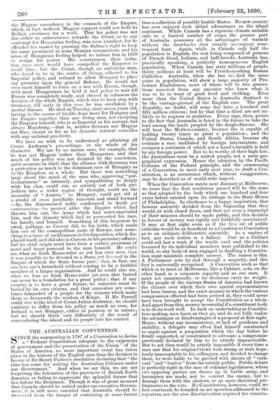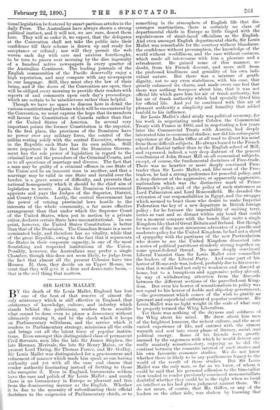the Magyar ascendency in the counsels of the Empire, time
a collection of possibly hostile States. No new country which, in fact, without Magyar support could not hold its has ever enjoyed such initial advantages as the island Balkan provinces for a week. That his policy was not continent. While Canada has a rigorous climate suitable due either to subservience towards the Court, or to any only to a limited number of crops, the greater part contempt for Hungarian feeling, was soon manifest, for he of Australia possesses all the advantages of warmth offended his master by pressing the Sultan's right to keep without the drawbacks that usually accompany semi- his name prominent in some Bosnian transactions, and his tropical heat. Again, while in Canada only half the sense of Hungarian feeling helped to induce him in 1879 population is English, the rest being composed of persons to resign his power. His countrymen, their irrita- of French blood, Indians, and half-breeds, Australia has, tion once over, would have compelled the Emperor to practically speaking, a perfectly homogeneous English recall him ; but the Count, though an ambitious man, population. When Canada has sixty millions of people, who loved to be in the centre of things, adhered to his i thirty millions at least will be French-speaking Roman Imperial policy, and refused to allow Hungary to place Catholics. Australia, when she has rel,,lied the same any pressure upon the general Referee. He would not point in population, will show a large majority of Pro- even exert himself to force on a war with Russia, though, testant Englishmen, most of whom will be two genera- with most Hungarians, he held it bad policy to wait till tions removed from any ancestor who knew what it Russia was completely ready, and obeyed in calmness the was to be in want of good. food and clothing. Even decision of the whole Empire, which was to keep step with more than the United States is Australia destined to Germany, till early in this year he was overtaken by a be the vantage-ground of the English race. The great mortal disease. He died on Tuesday, sixty-seven years old, Republic, no doubt, will some day have a hundred and having in the course of his life done more for Hungary and fifty million citizens ; but by that time a third are not un- the Empire together than any living man, not excepting likely to be negroes or mulattos. Every sign, then, points the Emperor himself, who is as Imperial as his servant, but to the fact that Australia is fated in the future to take the always Hapsburg,—that is, neither German nor Magyar lead among the lands peopled by the Anglo-Saxons. She nor Slav, except so far as his dynastic interest coincides will beat the Mother-country, because she is capable of with any national proclivity. holding twenty times as great a population ; and the United States, Canada, and South Africa, because she Count Andrassy's proceedings, or the whole of his contains a race undiluted by foreign intermixture, and character. We are by no means sure, for example, that occupies a continent of which not a hand's-breadth is held by any foreign power. But to be worthy of their high fate, he was not Magyar rather than Hungarian, and that the Australians must be a united people, not a mere geo- quite accurate in itself, that the alliance with Germany was graphical expression. Hence the adoption by the Pacific a protection as much to the dominant race of Hungary as Colonies of the Federal principle, and the summoning of a Convention, to meet early next year, to draft a Con- to the Kingdom as a whole. But there was something stitution, is an occurrence which, without exaggeration, large about the mind of the man who, approving " par- ma with his clan, could rise so entirely out of both pre- When the Convention meets next January at Melbourne, judices into a wider region of thought, could see the we trust that the first resolution passed will be the same necessity of " Austria " to Hungary, could get rid at as that adopted by the body which one hundred and four a stroke of even justifiable rancours and stand forward years before entered upon its sittings in the State House —he, the dispossessed noble condemned to death per of Philadelphia. In obedience to a happy inspiration, that contumaciain—to protect alike the Empire which had famous assembly decided from the beginning that they thrown him out, the Army which had court-martialed would sit with closed doors, and that not even a transcript him, and the dynasty which had so persecuted his race, of their minutes should be made public, and this decision his family, and himself. Something of this largeness he in favour of secrecy was rigidly and faithfully maintained. owed, perhaps, as Cavour did, to his birth, which made It may at first sight seem as if the free air of public him one of the cosmopolitan caste of Europe, and some- criticism would be as beneficial to a Constituent Convention thing to a trace of recklessness in his disposition, which dis- as to an ordinary deliberative assembly. As a matter of played itself, as it did also in Cavour, in his pecuniary affairs; fact, any such notion is a fallacy. Just as a Cabinet but its chief origin must have been a certain greatness of could not last a week if the words used and the policies mind and heart personal to the man himself. He could favoured by its individual members were published to the see, what no Irish Home-ruler as yet has ever seen, that world, so any body of men engaged in drafting a Constitu- it was possible to be devoted to a State, yet devoted to the tion must maintain complete secrecy. The reason is this. Empire of which the State forms part ; that, in fact, one A Parliament acts by and through a majority, and this can love one's household without ceasing to be a faithful fact is universally recognised. A Convention such as that member of a larger organisation. And he could also see, which is to meet at Melbourne, like a Cabinet, acts, on the what we fear no Irish Home-ruler yet sees, that hatred other hand, in a corporate capacity and as one man. It can never be a foundation for a great policy; that if any must act unanimously, or its decisions carry no weight. country is to have a great future, its rancours must be If the people of the various States of America, had known buried by its own citizens, and that amnesties are some- the clauses over which their own special representatives times demanded of a people for the reasons which make had been beaten, and the exact manner in which the various them so frequently the wisdom of Kings. If Mr. Parnell compromises effected had been arrived at, they could never could rise to the level of Count Julius Andrassy, we should have been brought to accept the Constitution as a whole. continue to differ from his policy as much as ever, for And apart from this, secrecy is essential if a constituent body Ireland is not Hungary, either in position or in nature ; is to do its work well. In such an undertaking as Constitu- but we should think very differently of the result of tion-making, men learn as they go, and do not fully realise Hence, without any inconsistency, or lack of prudence and stability, a delegate may often find himself constrained tional legislation be fostered by smart partisan articles in the daily Press. The Australians have always shown a strong political instinct, and it will not, we are sure, desert them here. They will so order it, we expect, that the delegates at the Convention shall not take the public into their confidence till their scheme is drawn up and ready for acceptance or refusal ; nor will they permit the web woven each day with care and anxious forethought, to be torn to pieces next morning by the dire ingenuity of a hundred active newspapers in every quarter of the Australian Continent. The leading journals of the English communities of the Pacific deservedly enjoy a high reputation, and may compare with any newspapers in our language. Still, they must obey the law of their being, and if the doors of the Convention are open, they will be obliged every morning to provide their readers with reports of and comments upon each day's proceedings, which are certain to be mischievous rather than helpful. Though we have no space to discuss here in detail the various constitutional problems which will be encountered by the Convention, we must express the hope that its members will favour the Constitution of Canada rather than that of the United States of America. In several very important points the former Constitution is the superior. In the first place, the provinces of the Dominion have no power over any military force, the control of the militia resting solely with the central Executive, whereas in the Republic each State has its own militia. Still more important is the fact that the Dominion Govern- ment has the sole power of legislation in regard to the criminal law and the procedure of the Criminal Courts, and as to all questions of marriage and divorce. The fact that a man may be guilty of a criminal offence in one State of the Union and be an innocent man in another, and that a marriage may be valid in one State and invalid over the border, is a grave source of difficulty, and prevents that national homogeneity which it should be the chief aim of legislation to secure. Again, the Dominion Government appoints and pays the Judges of the Superior, District, and County Courts. Lastly, the central Government has the power of vetoing provincial laws hostile to the interests of the whole community, a far more effective arrangement than that under which the Supreme Court of the United States, when put in motion by a private suitor, declares certain State laws unconstitutional. In one point, however, the United States Constitution is better than that of the Dominion. The Canadian Senate is a mere nominated body, and therefore has no vitality, while that of the great Republic, owing to the fact that it represents the States in their corporate capacity, is one of the most flourishing and respected institutions of the Union. Possibly, however, the Australians may prefer a single Chamber, though this does not seem likely, to judge from the fact that almost all the present Colonies have two Houses. If, then, they decide on an Upper House, we trust that they will gave it a firm and democratic basis,— that is the real thing that matters.







































 Previous page
Previous page